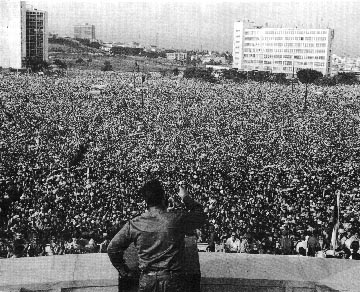More about the “true” glories of Communism and the ignorant leftist rabble that gravitates to it. The facts, however, may not sit well with the little lefties that revel in Castro’s “leadership”…
[quote]Andy Garcia blew it big-time with his movie The Lost City. He blew it with the mainstream critics that is. Almost unanimously, they’re tearing apart a movie 16 years in the making, which Garcia both directed and stars in. In this engaging drama of a middle-class Cuban family crumbling during free Havana’s last days, Garcia insisted on depicting some historical truth about Cuba – a grotesque and unforgivable blunder in his industry. He’s now paying the price.
Earlier, many film festivals refused to screen it. Now many Latin American countries refuse to show it. The film’s offenses are many and varied. Most unforgivable of all, Che Guevara is shown killing people in cold blood.
“Where did Garcia get this preposterous notion of pre-Castro Cuba as a relatively prosperous but politically troubled place?” ask the critics. All the Cubans he portrays seem to come from the middle class. “Where in his movie is the tsunami of stooped and starving peasants that carried Fidel and Che into Havana on its crest?” they ask. “Where’s all those diseased and illiterate laborers and peasants my professors, Dan Rather, CNN and Oliver Stone told me about?” ask the critics.
Garcia has seriously jolted the Mainstream Media’s fantasies and hallucinations of pre-Castro Cuba, Che, Fidel, and Cubans in general. In consequence, the critics are unnerved and disoriented and their annoyance and scorn are spewing forth in review after review.
“In a movie about the Cuban revolution, we almost never see any of the working poor for whom the revolution was supposedly fought,” sniffs Peter Reiner in The Christian Science Monitor. “The Lost City’ misses historical complexity.”
Actually what’s missing is Mr. Reiner’s historical knowledge. Andy Garcia and screenwriter Guillermo Cabrera Infante knew full well that “the working poor” had no role in the stage of the Cuban Revolution shown in the movie. The Anti-Batista rebellion was led and staffed overwhelmingly by Cuba’s middle – and especially, upper – class. In August of 1957 Castro’s rebel movement called for a “National Strike” against the Batista dictatorship – and threatened to shoot workers who reported to work. The “National Strike” was completely ignored. Another was called for April 9, 1958. And again Cuban workers ignored their “liberators,” reporting to work en masse.
“Garcia’s tale bemoans the loss of easy wealth for a precious few,” harrumphs Michael Atkinson in The Village Voice. "Poor people are absolutely absent; Garcia and Infante seem to have thought that peasant revolutions happen for no particular reason


